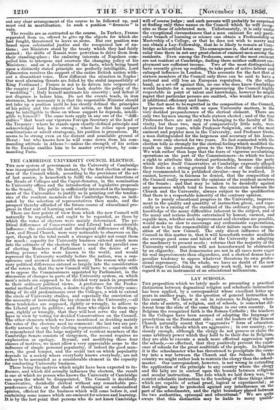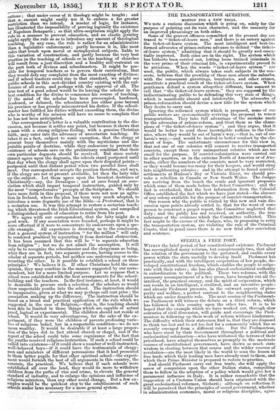LAY SCHOOLS.
THE proposition which we lately made as presenting a practical distinction between dogmatical religion and scholastic instruction has been applied, by a correspondent whose excellent letter ap- pears in another page, to the question of general instruction in this country. W We threw it out in reference to Belgium, where the state of society, of religion, and of schools, is somewhat dif- ferent from the state of the same things in our own country. In Belgium the recognized faith is the Roman Catholic ; the teachers in the Colleges have been accused of adopting the language of proselytism on the Protestant side ; and the leaders of the Roman Church naturally resent that " aggressive " form of education. There it is the schools which are aggressive ; in our country, cu- riously enough, although the clergy do not possess or claim the same arbitrary power which they hold to be their due in Belgium, they are able to execute a much more effectual aggression upon the schools,—so effectual, that they positively prevent the exist- ence of schools for the great multitude of the people. In Belgium it is the schoolmaster who has threatened to precipitate the coun- try into a war between the Church and the Schools. In this country we might rather look to restrain the clergy than the school- master. Our correspondent, however, is not wrong in extending the application of the principle to any country where the clergy and the laity are in contest upon the bounds between religious and secular instruction. The rule which we laid down was, "to restrict scholastic instruction to the teaching of those things alone which are capable of actual proof, logical or experimental; BO that religion may be protected against any interference on the part of the schoolmaster, and the right boundary placed between the two authorities, episcopal and educational." We are quite aware that this distinction may be liable to many qualifl- cations ; that under cover of it theology might be taught ; and that a casuist might easily use it to enforce a far greater restriction than we intend. A master of logic, for instance, has illustrated the impossibility of proving logically the existence of Napoleon Bonaparte ; so that ultra-scepticism might apply the rule in a manner to prevent education, and an elastic lestulay might apply the rule so as to introduce any amount of theological teaching. In any case, the rule is rather for an administrative than a legislative enforcement; partly because it is, like most rules that touch upon moral or metaphysical subjects, liable to this variation of construction, and partly because the very best practice in the teaching of schools or in the teaching of churches will result from a just discretion and a healthy self-restraint on the part both of divines and schoolmasters. It might be pos- sible for temporal teachers so to govern their curriculum, that they would defy any complaint from the most exacting of divines; and if school teachers could rise to that standard, we might see public schools in this sect-divided country existing with the suf- ferance of all sects, and perhaps with the approval of all. The true test of a good school would be its leaving the scholar in the best condition for the divine to commence his course of teaching. If the mind of the scholar has been preoccupied, hardened, deadened, or debased, the schoolmaster has either gone beyond his province or has grossly misconstrued his duties. If the school- master has fulfilled his duties without exceeding them, the divine who is worthy of his mission will have no cause to complain that he has not been anticipated. Our correspondent's letter is a valuable contribution to the dis- cussion, not because it settles any point, but because it shows that a man with a strong religious feeling, with a genuine Christian faith, may enter into the advocacy of unsectarian teaching. He takes it as a fact, subject to some exception, that the clergy at present busy themselves mainly with the mysticisms and dis- putable points of doctrine, while they endeavour to prevent the existence of schools save on the preliminary condition that their own particular dogmata should be received'. But since society cannot agree upon the dogmata, the schools stand postponed until that day when the clergy shall agree upon their disputed points— postponed until that distant period when two parallel lines shall meet. Our correspondent accepts the position therefore, and says, if the clergy are not at present available, let then the laity take up the subject.. Let them agree upon ihe broadest, doctrines of Christianity—say, the Decalogue ; and at once found an asso- ciation which shall impart temporal instruction, guided only by the most " comprehensive " precepts of the Scriptures. We should have more faith in this proposal, if there were not now an agita- tion in Ireland, where the plan has been very much adopted, to introduce a more dogmatic use of the Bible—a Protestant, that is a sectarian use. It was this attempt to restore a sectarian teach- ing which threatened the Irish Educational system, and compelled a distinguished apostle of education to retire from his post.
We agree with our correspondent, that the laity might do a good work. If any association were founded, perhaps it might be more effectual if it were to concentrate its endeavours upon a spe- cific example. All experience is drawing us to the conclusion, that a general system of instruction " for the million" will only be rendered practical by separating it from doctrinal obstruction. It has been assumed that this will be " to separate education from religion " ; but we do not admit the assumption. It will only be to recognize the schoolmaster and the clergyman as being, what they are in fact, two separate persons, havmg access to the scholar at separate periods, but neither one undervaluing or coun- teracting the other. Is it possible to establish a school on these principles ? We believe it is. If other Christians hold the same opinion, they may combine in the manner suggested by our corre- spondent, but for a more limited purpose. Let us suppose that 'a school were established with the best arrangements for the school- building and the teachers. In the first instance, at least, it would be desirable to procure such a selection of the scholars as would draw respectable youths into the school. The instruction should be inexpensive, given at what we may perhaps call cost price ; the association making up the difference. The instruction should be based on a broad and practical application of the rule which we suggested in the case of Belgium,—that is, the teaching should bona fide be limited to those things which are capable of actual proof, logical or experimental. The children should not reside at school. It would be very advantageous, for the sake of the ex- periment, if they were the children of parents professing varie- ties of religious belief, but in a respectable condition—we do not mean wealthy. It would be desirable if at least a large propor- tion of the boys did in fact attend church or chapel, and if the report of the school could take some cognizance of the fact that the youths received religious instruction. If such a school could be called into existence—if it could show a number of well-instructed, well-behaved boys—if it could have the testimonials of clergy- men and ministers of different persuasions that it had presented to them better pupils for that other spiritual school—the experi- ment would furnish the best of all arguments in this country, the concrete, the practical. We believe that if such schools were established all over the land, they would do more to withdraw children from the paths of vice and crime, to elevate the general standard of industry, and to enlarge the opinions and influence of religious ministers, than any other social change. But a few ex- amples would be the quickest step to the establisument of such schools under laws necessary for a more general system.



























 Previous page
Previous page